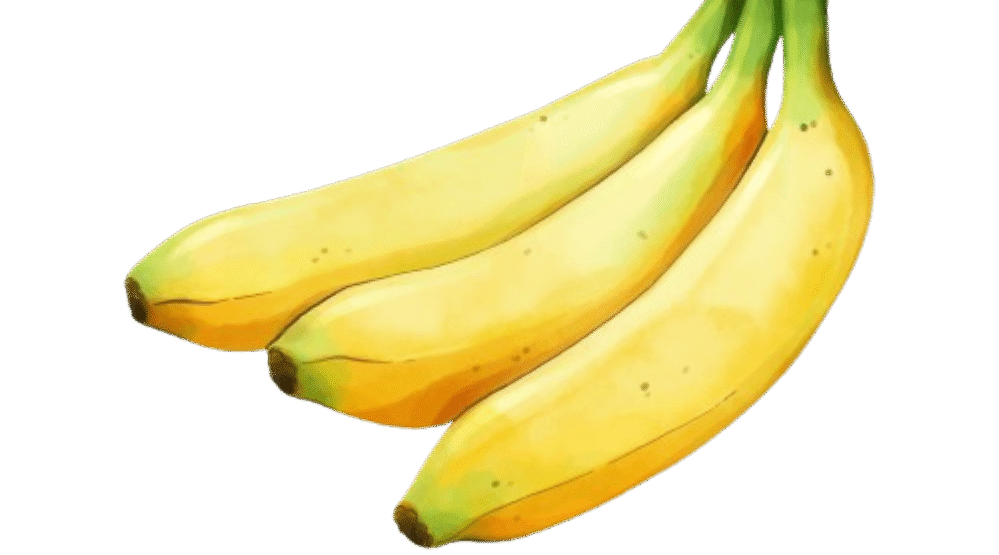Bananas (Musa spp.) are one of the most widely consumed fruits in the world, known for their sweet taste, nutritional richness, and versatility. Native to Southeast Asia, bananas are now cultivated in tropical and subtropical regions across the globe, with India and China being the largest producers.
Banana (Musa spp.): A Comprehensive Guide
Packed with potassium, fiber, vitamins, and antioxidants, bananas are recognized for their heart health benefits, digestive support, and energy-boosting properties.
This guide explores its history, nutritional profile, health benefits, medicinal uses, cultivation, and recipes.
Historical Significance & Cultural Importance
Bananas have been cultivated for over 7,000 years, with references found in ancient Greek, Latin, and Arabic texts.
Banana in Ancient Traditions
- Southeast Asia: First domesticated in New Guinea, later spreading to India and Africa.
- Alexander the Great: Discovered bananas during his expedition to India.
- Islamic Traditions: Considered a fruit of paradise.
- Caribbean & South America: Introduced by Portuguese explorers in the 15th century.
Botanical Description
Bananas belong to the Musaceae family and are classified under the Musa genus.
Plant Characteristics
- Growth: Herbaceous plant, reaching 3–7 meters in height.
- Leaves: Large, broad, and green, often torn by wind.
- Flowers: Purple-red, forming clusters known as inflorescences.
- Fruit: Elongated, curved, with soft flesh covered by a yellow, green, or red peel.
Cultivation & Growing Conditions
Bananas thrive in warm, humid climates and require well-drained soil.
- Ideal Temperature: 26–30°C for optimal growth.
- Soil Type: Loamy, slightly acidic soil with good drainage.
- Propagation: Grown from rhizomes or suckers.
- Harvesting Season: Year-round, with peak production in summer and monsoon.
Nutritional Profile of Banana
Bananas are rich in essential nutrients, making them a superfood for overall health.
Nutrients in Banana (Per 100g Serving)
| Nutrient | Amount | Health Benefits |
|---|---|---|
| Vitamin B6 | 0.4mg | Supports brain function & mood regulation |
| Potassium | 358mg | Regulates blood pressure & heart health |
| Fiber | 2.6g | Improves digestion & gut health |
| Magnesium | 27mg | Supports muscle & nerve function |
| Vitamin C | 8.7mg | Boosts immunity & skin health |
| Carbohydrates | 22.8g | Provides sustained energy |
Health Benefits of Banana
1. Supports Heart Health & Blood Pressure Control
- High potassium content regulates blood pressure and prevents hypertension.
- Lowers LDL (bad cholesterol) and boosts HDL (good cholesterol).
- Improves circulation, reducing the risk of heart disease.
2. Boosts Digestion & Gut Health
- Rich in fiber, preventing constipation and bloating.
- Contains prebiotics, promoting healthy gut bacteria.
- Regulates gastric juices, improving nutrient absorption.
3. Enhances Energy & Athletic Performance
- Natural sugars (glucose, fructose, sucrose) provide instant energy.
- Electrolytes prevent muscle cramps, making bananas ideal for athletes.
- Boosts stamina, improving physical endurance.
4. Supports Brain Function & Mental Health
- Vitamin B6 enhances neurotransmitter production, improving mood and focus.
- Reduces stress and anxiety, promoting mental clarity.
- Protects against neurodegenerative diseases like Alzheimer’s.
5. Aids in Weight Loss & Metabolism
- Boosts metabolism, helping burn fat faster.
- Suppresses appetite, reducing cravings.
- Detoxifies the body, eliminating toxins that slow weight loss.
6. Helps Manage Diabetes Naturally
- Regulates blood sugar levels, preventing spikes.
- Improves insulin sensitivity, reducing diabetes risk.
- Contains resistant starch, which slows glucose absorption.
7. Enhances Skin & Hair Health
- Vitamin C boosts collagen production, improving skin elasticity.
- Banana pulp hydrates and nourishes, preventing dryness and dullness.
- Banana peel reduces acne and scars, promoting clear skin.
Medicinal Uses of Banana
1. Banana Smoothie for Energy & Recovery
- Recipe: Blend 1 banana, almond milk, honey, and chia seeds for a nutrient-packed energy drink.
2. Banana Peel for Skin & Acne Treatment
- Usage: Rub banana peel on acne-prone skin to reduce inflammation and scars.
3. Banana Tea for Sleep & Relaxation
- Recipe: Boil banana peel with cinnamon and honey for a natural sleep-inducing tea.
4. Banana Hair Mask for Shine & Strength
- Recipe: Mash ripe banana, mix with coconut oil, apply to scalp, leave for 30 minutes, then rinse.
5. Banana Leaf Wrap for Joint Pain Relief
- Usage: Warm banana leaves, wrap around painful joints, and leave for 30 minutes to reduce inflammation.
Scientific Research on Banana
Several studies confirm banana’s therapeutic properties:
- Banana improves digestion and gut health (Journal of Nutrition, 2023).
- Banana peel extract enhances skin healing (Dermatology Studies, 2022).
- Banana’s potassium content supports heart health (Cardiology Research, 2021).
How to Include Banana in Your Diet
- Raw Banana – Eat fresh for maximum benefits.
- Banana Smoothies – Blend with yogurt and nuts.
- Banana Chips – Dehydrated for a crunchy snack.
- Banana Pancakes – Mashed banana mixed with oats.
- Banana Leaf Cooking – Used for steaming fish and rice dishes.
Side Effects & Precautions
While bananas are generally safe, excessive consumption may cause:
- High sugar intake, affecting diabetics.
- Potassium overload, leading to kidney issues.
- Allergic reactions in sensitive individuals.
Conclusion
Bananas are truly a superfruit, offering unmatched health benefits for heart health, digestion, energy, brain function, skin, and weight management. Whether consumed raw, as smoothies, chips, or tea, they remain a powerful natural remedy for overall wellness.
Start incorporating bananas into your daily routine and experience their incredible benefits.




